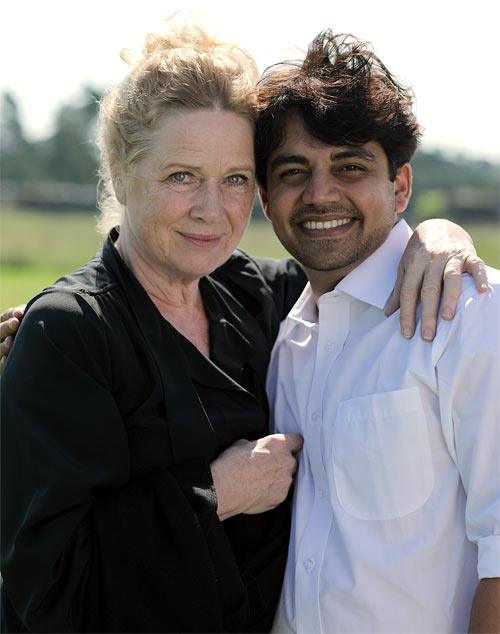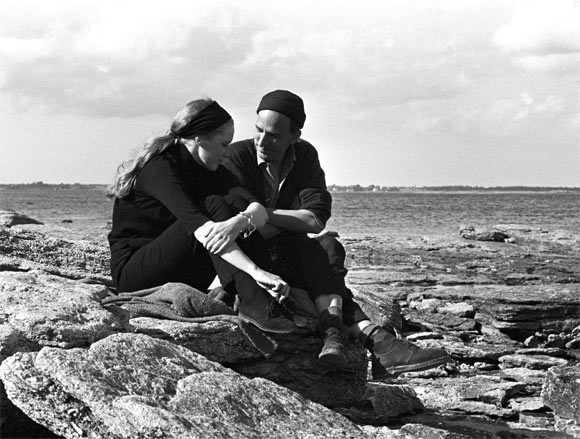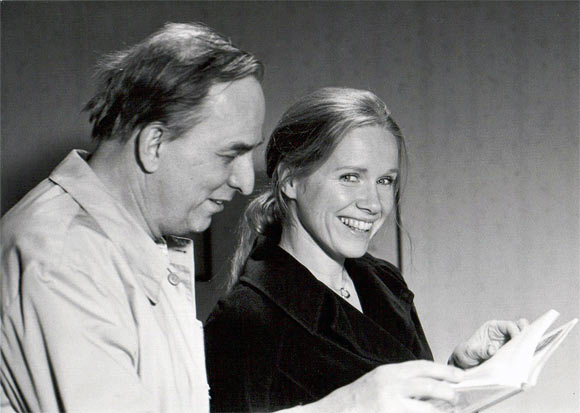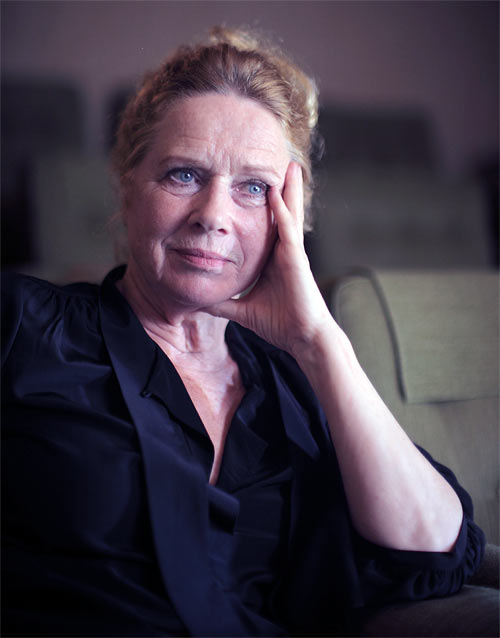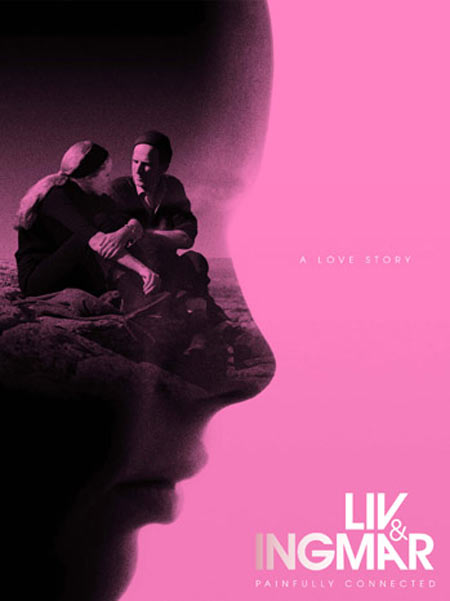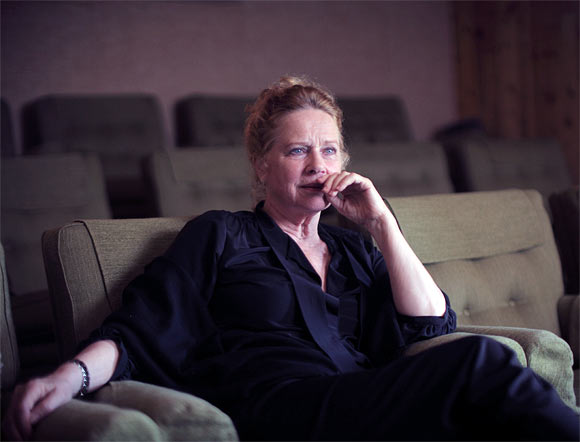 | « Back to article | Print this article |
'I really want Amitabh to see my documentary Liv & Ingmar'
Norwegian actress Liv Ullmann was 25 years old when she came to Sweden to act in Ingmar Bergman's film Persona. Bergman was 47 at that time. They were both married but they fell in love during the making of the film, left their spouses, had a child and lived together for five years.
Ullmann eventually began to feel stifled living under the shadow of a giant filmmaker, who would go through mood swings and was very controlling, and soon left him.
But over the years, their love developed into a deep personal and professional friendship. Ullmann acted in 12 films directed by Bergman.
In his new documentary Liv & Ingmar, Indian filmmaker Dheeraj Akolkar, 35, has captured the love, the emotional breakup, the heartache and finally the deep connection between the two legends. Liv & Ingmar is a moving, candid look at the personal lives of two of the greatest artists of our times.
The film recently had its US premiere at the New York Film Festival. Later this month, Akolkar's film will be shown at the Mumbai Film Festival (MAMI).
Aseem Chhabra spoke to Akolkar while the filmmaker was in Oslo heading to New York for the film's US premiere.
This is the first feature length you have made, but why a documentary?
I come from narrative cinema. I always worked in fiction. But somehow I knew that this film needed a documentary format. And because Liv was there, so I knew this story could only be told as a documentary.
How did you have this fascination with Ingmar Bergman and Liv Ullmann? When was the first time you saw a film by Bergman?
Well, very recently. I have to say in 2006. But I had read Liv's autobiography Changing, of another well known documentary filmmaker and actor named Zul Vellani. Zul passed away on December 31, 2010, but he was like a father-figure, a mentor to me. I found the book and started reading it and was fascinated. It was a very human document written by this wonderful woman. And through the book, I met Ingmar Bergman. I had heard of Liv Ullmann, but I hadn't seen any of their works.
'Liv Ullmann had initally denied to make the documentary'
I suppose you went and got DVDs. Which was first film you saw?
I came to study in London in the autumn of 2006 and my library had about 70,000 films. I started with Persona (1966).
That makes sense. It was their first film together.
Yes. And then I saw them in chronological order all the way up to Saraband (2003), all 12 of them.
How did you meet Liv and approach her?
Ingmar Bergman passed away in 2007, and it just came into me that I should do this film. A Norwegian friend was coming to stay with me from Oslo and she asked me what she could get for me. I asked her for Liv Ullmann's address.
She managed to get it the next year.
I wrote to Liv and she responded and said 'Yes, I would do an interview.'
At that time, she was going to Sydney to direct A Streetcar Named Desire with Cate Blanchett. She told me she would be very busy.
It took me two and a half years to find the finances, a producer and finalise the details. But when my producer in Norway contacted her and told her we'd like to make a film on her life, she said no.
My heart sank.
We made another request to her to meet me and she agreed, but added that she still didn't want to do the film.
We met and she asked me why I wanted to do the film. We started to talk and in five minutes, her eyes welled up and she held my hand and said yes. After that, she was on board. It didn't take much convincing. It was really about meeting her.
Have there been other films on their lives?
There have been other films on their works, but this is he first one on their relationship.
'I didn't want to make a story about great legends'
I loved the way you use so many scenes from Bergman's films to narrate the story, and some of its true and autobiographical. That's what he was doing right?
Yes, I think like other great filmmakers, his cinema is very autobiographical. By that I don't mean, 'Oh this happened in my life, so I should write it.' But so many things can be autobiographical. A mood can be autobiographical, emotions, expressions, words can all be autobiographical. He was writing about his life, the life that he had lived and the life that he wanted to live.
How did you decided to break the film in various chapters?
Well, I didn't want to make a story about great legends. They are legends, we know that. But I wanted to make a story about two friends. It is a structure that I arrived at as I worked through the emotional part of the story. I could have divided the film into Persona, Hour of the Wolf, The Passion of Anna, and Shame but no, I thought this is about love, loneliness and pain.
Each time you showed scenes from Bergman's films, you didn't think it was necessary to identify them?
My producer did ask me this but I thought of not identifying the films because the context in which I was using these scenes is an emotional one. I didn't want the audience to be aware that this is taken from so and so film.
'Liv Ullmann in tears when she saw the film'
You do list all the films in the end, so this is a good format.
Because you know what is happening is that these films are not illustrating, but they are complimenting what was going on in Liv's and Ingmar's lives. So I wanted to take these scenes to take the story forward and play as plot points of the films.
Has Liv seen the film?
Oh yes, and that was the first reaction I was really, really apprehensive about. We sent her a DVD as soon as a rough cut was done. I was in London when she called. She choked up. She was in tears. She said something really beautiful. She said 'Even I did not know so many things about my relationship with Ingmar and I learned from this film.' That was incredible.
She also said 'This is a gift for me.' She was really moved. That was it for me. I knew my film had worked.
You haven't sat and watched the film with her?
I saw the film with her at the Montreal World Film Festival. But the first time she saw it in Boston with her husband and her friends, that was when she was really moved.
'I wanted Liv to narrate the most important story of her life'
Did you consider talking to any other friends of Liv and Bergman? Max von Sydow was in practically all of the film's of Bergman with Liv. Max was almost the alter-ego of Bergman.
Initially, I had six people in my mind -- Ingmar Berman, Sven Nykvist (Bergman's regular cinematographer), Bibi Andersson and Erland Josephson (both regular actors in Bergman's films). Josephson was very sick and passed away.
I wanted to include Linn Ullmann (Ullmann's and Bergman's daughter) and Max von Sydow. Linn was busy writing her book and Max was busy doing Stephen Daldry's film (Extremely Loud & Incredibly Close). So it all fell away.
I was with Liv at one point and I said this is better. That had been the first theme I wrote that she tells the story. So I thought I just need her point of view. I do not need validation. I don't want people to add or conflict with something she says. I just wanted Liv to narrate the most important story of her life.
The interviews with Liv were shot in the house on the island that Bergman had build, right?
Yes, this is the spot where they met and he declared his love for her. He built the house for her.
Who owns the house now?
It belongs to a trust. It's an artists' residence that Linn has started. As artists, you can stay there for a few months and do artistic work.
'I worked with Amitji on Black'
I read that you had done some work on Lagaan and Devdas. What did you do on those films?
I am an architect to start with. During my fourth year, I did an internship with (art director) Nitin Desai. I started on Hum Dil De Chuke Sanam on the Nimbooda song, and then I went to work on Lagaan for six months in the art department. I worked on Devdas, also in the art department, for a year and half. And then I moved to assist Mr (Sanjay Leela) Bhansali.
So films became your passion and you switched from architecture.
Absolutely. The first day I walked into Mehboob studios (in suburban Mumbai), floor number three on the sets of Nimbooda, I remember the day, I remember the time. There was nothing else I wanted to do after that.
What's next for you? Are you travelling to MAMI after the New York premiere of the film?
I am working on another film in the life of Edvard Monk, the painter. Around the time of the Mumbai Film Festival, I will be between Oslo and Berlin. Although I am planning on inviting Amitji (Amitabh Bachchan) for the film. I really want him to see it. If he agrees to watch it, I will come to Mumbai.
I worked with him on Black. I haven't met him for the last many years but I have been writing to him. During Black, I had decided that when my first film premieres in India, I will write to him and invite him for it.
There are other people who have seen the film in Singapore -- Shabana Azmi, Javedsaab (Akhtar), Kamal Haasan and Prateik. They all saw it and liked it very much.
